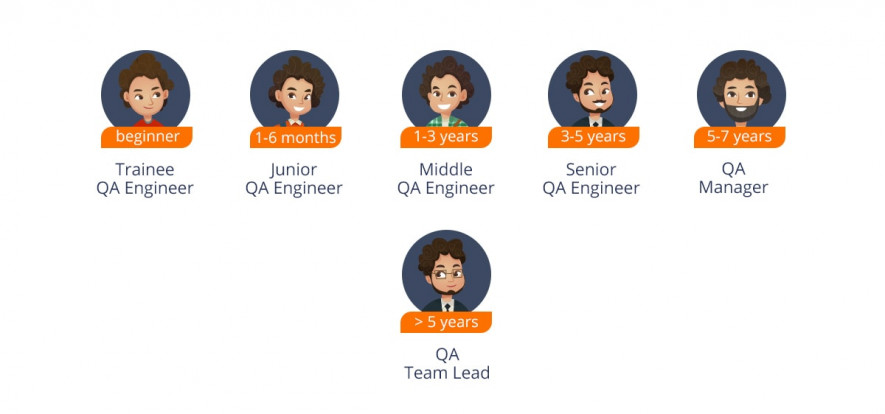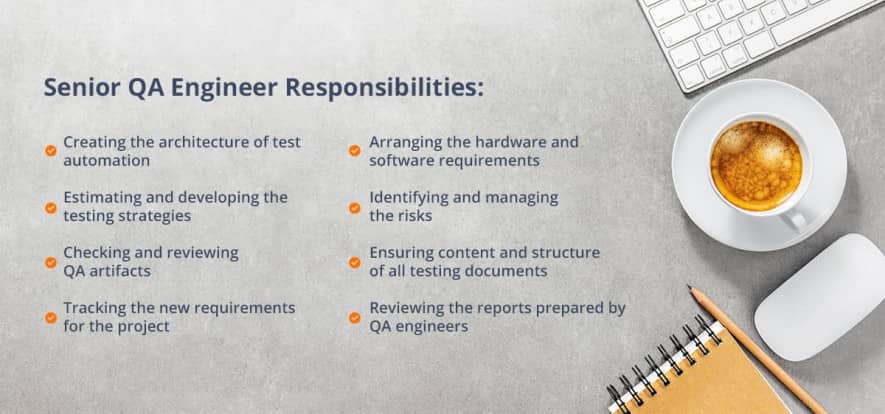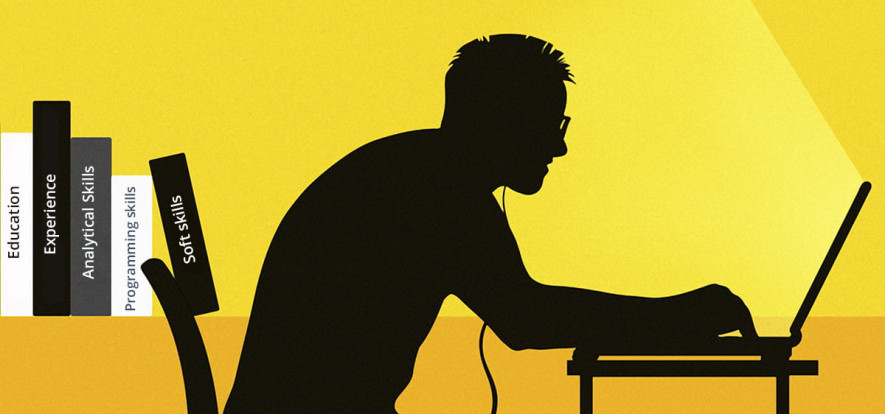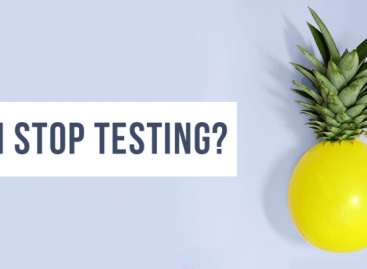- QATestLab Blog >
- QA Basics >
- What Are the Duties of Senior Software QA Engineer?
What Are the Duties of Senior Software QA Engineer?

Note: this article was updated in December 2019.
Being a Senior Software QA engineer is not just something you sit and wait 5 years to magically morph into. There’s work to do and not just hard work. What skills do you need to possess to sniff out the junior level? This article from QATestLab provides the list of required skills and duties that will bring you closer to the position of Senior QA Engineer.
Overview of QA Engineers Roles and Titles
Becoming involved in any profession, we are all wondering what kind of future is waiting for us. Growth prospects, high salaries and the ability to climb up the career ladder often become our strongest motivations. But to speed up a process of achieving something, we need to clearly spell out goals. Just like that in the case of testing, the first step is to differentiate the key roles and the necessary skills.
Junior, Middle and Senior QA engineer – what’s the difference between them and why is there such a division? The picture of QA roles and titles will give you an answer.

- Trainee QA Engineer — some companies identify this position as the entry-level one. Trainee QA learns everything in the course of his work.
- Junior QA Engineer/ — a specialist who has worked from 1 to 6 months and has acquired a certain set of skills concerning web, mobile and software testing. He knows bits and pieces on what is a test plan, test case, test suite, test step, test design and more. He also has a basic understanding of SQL and working with databases. Despite all these skills, his work is always checked by specialists with a higher status.
- Middle QA Engineer — a mid-level specialist with work experience of 1-3 years, able to work independently and advising junior staff. He has all the necessary basic knowledge, works independently on complex tasks. In case of doubt, he may consult with the team-leader or other colleagues.
- Senior QA Engineer — a highly qualified specialist with work experience of 3-5 years. He can effectively solve the most complex tasks related to both technical and organizing sides of work. He perfectly performs senior QA duties and knows best how to prioritize, plan and delegate tasks.
If you thought this is the end of the professional road, that’s not so. After successfully passing these 4 stages, you have an opportunity for growth in two possible directions:
- QA team lead – QA-manager – Head of QA department
These roles are following one by one in ascending order. Specialists on these positions confidently manage a team of testers and sometimes developers. They take part in really challenging tasks: participation in pre-sales, selection of technology stack, architecture, team selection, long-term planning, risk assessment. Plus, they have a clear strategic understanding of SDLC (Software Development Life Cycle).
- Developer, development manager, analyst, architect, project manager
After becoming an absolute hero in quality assurance, you can easily switch to a slightly different area with new growth prospects.
What Are the Responsibilities of Senior QA Engineer?
Now it’s time to focus on one position from the picture of testing roles – senior QA engineers – who are they and what they do? Let’s dive deeper into the main responsibilities and testing duties of senior QA engineers:

All-in-all, all these responsibilities come down to one senior QA duty – to monitor and process everything concerning testing. Communications, meetings, clarification of requirements, explanations to developers about what, why, how and where. He is involved in a variety of different processes, which are not always directly related to testing.
What Qualification Should a Senior Quality Assurance Tester Have?
After getting acquainted with the senior QA tester responsibilities, it’s quite logical you may ask: “What knowledge and qualifications are needed to apply for this job?”. For this reason, we have prepared the list of all the weapons senior QA should have.

Education: To be tester and especially senior QA engineer, you are expected to have completed an undergraduate qualification in Computer Science, Math, Statistics, Business Development, Product Management, or any other related field.
Experience: When applying for senior software tester position, you are expected to have at least 4 years of experience in functional and non-functional testing. You must be well-oriented in the whole range of processes and have a strong knowledge of software QA methodologies.
Analytical Skills: Senior QA should demonstrate an ability to query and manipulate data. SQL experience would be a gain for successfully managing all kinds of data manipulation processes.
Programming skills: Here comes in handy experience working with various QA tools inclusive of bug and defect tracking systems. Senior QA manager candidate does not have to charge headlong into programming; it is enough to be fluent in at least one or two programming languages.
Soft skills: These skills can be divided into the following job duties:
- Communication skills. It is important to be able to present yourself. A person can have enormous potential, excellent abilities for a certain type of work, but all this will go unnoticed if he cannot prove it. Senior knows how to take responsibility, solve a problem that no one wants to take on. And the point is not just to send a hundred letters, but to achieve the desired result.
- Proactivity and willingness to take responsibility. Senior QA can’t just sit and wait until someone tells him what to do. He is a part of the team and his action or inaction directly affects the quality of the product and, as a consequence, the whole company.
- Planning skills. Senior QA should have perfect organizing and multitasking skills. He needs to see in advance where downtime or overloads can occur and take steps to smooth them out.
To sum it up, senior software QA engineer is a person who typically sees the picture of all testing processes in two ways – both internally and externally. He perfectly copes with complex tasks independently and assists junior colleagues. He has a very good understanding of how to assess certain situations, set priorities, plan and delegate tasks to other specialists.
Conclusions
In this article, we tried to do our best to cover technical and soft skills that matter most for senior QA engineers. In conclusion, it is worth to add one more thing. Being a senior is not merely about years of experience. It all comes down to the level of tasks you actually can solve. Besides, seniors is a certain mindset. While the junior is just thinking about accomplishing tasks, the senior is thinking about the correct organization of the whole working process.
Do you have something to add? Feel free to give your opinion in the comments below. If you are inspired to learn more about QA/QC processes, visit our blog.
Learn more from QATestLab
Related Posts:
- What is Teamwork for Senior Software QA Engineer?
- When Bugs Tank Your Rankings: How QA Testing Drives SEO Performance
- ICE Barcelona 2026: Between Poker Wins and Talks on QA in iGaming
About Article Author
view more articles
has more than 2-year experience in blogging and copywriting, copyediting and proofreading of web content.
View More Articles






No Comments Yet!
You can be the one to start a conversation.